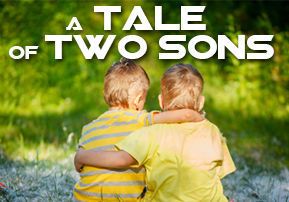
A Tale of Two Sons
There were two sons – one intelligent and extremely well-mannered – and the other a wild mischief maker who couldn't spell his own name properly...

I'm going to tell you a story about a family with two very opposite sons. This is only a story, but it represents something that you might be experiencing in your own life or with your own children. This story will answer two questions that everyone asks themselves: first, what's lacking in a person who doesn't succeed? And second, what is success?
Here's the story:
A family had two very different sons; one was intelligent and well-mannered, a straight-A student and the joy of his rabbis and teachers. At fifteen, he had already completed a dozen Gemara tractates in-depth and he was no pushover in his secular studies either. He loved sciences and mathematics at was apparently on a golden road to success. His parents understandably adored this son, who we'll call Avi. At home, he was no less of a charm, always clearing the table or taking out the trash without being asked at all.
The older brother, Kenny, was quite a different story. At sixteen and a half, he had already stolen two cars and was currently on juvenile probation. He migrated from school to school until he finally left irate teachers, rabbis and classrooms completely behind. He was now off the path of observant Judaism completely, living the life of a stray cat with other kids like him in the streets of Brooklyn. He could read English and Hebrew, but he could barely spell his name in either language. But, in contrast to his brother's  scrawny body, Kenny was a powerhouse with muscles like iron. People were afraid of him even though, deep down, he was a sensitive person who would always come to the aid of a bullied child or an elderly person in need.
scrawny body, Kenny was a powerhouse with muscles like iron. People were afraid of him even though, deep down, he was a sensitive person who would always come to the aid of a bullied child or an elderly person in need.
The parents constantly scolded Kenny: "Why can't you be like your brother? Why do you give us so much grief? Why do you roam the streets late at night? You're an embarrassment to the family! You'll never amount to anything! You have no idea what punishment lies in store for you in the next world…"
It's no wonder that Kenny despised his brother. Avi, the "righteous" goody-goody and apple of everyone's eye, enjoyed being mom and dad's favorite. Kenny hated being compared to his goody-goody brother and hated hearing about how wonderful Avi is and how loathsome he is.
At this point, I'm going to interrupt the story. The parents have it all wrong. Let's now ask Hashem what He thinks of Avi and Kenny, and the parents' favoritism. Here's what Hashem would tell Kenny's parents:
"Avi is a good boy because I gave him a weakling evil inclination. Avi hardly gets any resistance when he puts on tefillin, opens a Gemara or sets the Shabbat table. He has a very minor spiritual correction to do, and since I don't want him to ruin all the good he has already attained in previous incarnations, he is getting special protection from sin…
"Kenny, on the other hand, has a huge spiritual correction to attain; he therefore has a huge evil inclination; his life will never be easy and he'll have to fight temptation his entire life. Any tiny mitzvah that Kenny does in this world, like helping an elderly man with a walker cross the street safely, illuminates the Heavens more than the mitzvoth of Rabbi Akiva and his contemporaries. Once Kenny channels his energies into teshuva, he'll do tremendous things. It's therefore not gratifying to Me when you praise and pamper Avi without uplifting and encouraging Kenny, even if does flick on the light switch in his bedroom on Shabbat. Patience – just shower love on him and don't worry about what others say. Potentially, he can give you tenfold the joy and gratification that you derive from Avi"
And here's what Hashem would tell Kenny:
"Kenny, My beloved son, you have one hundred times the strength and potential of your brother. Look what you do out in the streets – all the other boys look up to you. You're courageous and kind; don't think for a moment that I don't see all the good things you do for people – discreetly, with no brass bands and award certificates. You are a visionary, My son, and a born leader. Use your power to build rather than to destroy. I will always be with you." This was the first time that Kenny ever heard anything good about himself. He listened to Hashem. He went to work for a building contractor; in no time, he picked up a whole range of building skills. Before long, he became self-employed and enjoyed super success. He became the contractor who initiated high-quality, low-price housing projects for Torah families…
Avi too was successful, but in the Heavenly Court, all his Gemara learning in Kollel, which came with little interference from his puny evil inclination, can't compare to Kenny's achievements, earned at the price of a non-stop war with a most powerful adversary, a Cain-league evil inclination.
How do I know what Hashem would say to Kenny? That's exactly what He said to Cain, the "bad boy". Cain had an evil inclination that could kill fifty steel workers. Abel was a good boy with a tiny wisp of an evil inclination. If Cain would only have listened to Hashem, we can't fathom the heights he would have reached. But, he used his power to destroy his brother rather than to do Hashem's will.
Now, in light of our story, let's answer our questions. Why doesn't a person succeed? It's because he measures himself against what the world calls success. If he's not as rich as Rothschild, he considers himself a failure. If he's not as brilliant as Einstein or as pious and scholarly as the Chazon Ish, he loses heart and thinks he's a loser. Nothing could be further from the truth.
Success is not what society thinks of you! Success is happiness with your lot in life. Hashem doesn't look at the results of what you do, because the results are up to Him! Hashem looks at your efforts – your prayers, your desire, your yearning. This is what counts! If any achievement is not tied to emuna, it's not success.
We live in a rough generation, so much so that the holy Amoraim Ula and Raba said that they don't want to be in the generation that ushers in Moshiach. Rebbe Nachman teaches us that the tiniest spiritual accomplishment in this challenging generation outshines the magnificent achievements of our ancient sages.
From this moment on, don't be down on yourself if you're not a success in society's eyes and certainly don't be down on your children. Speak to them like Hashem would. Encourage them and teach them emuna, for learning emuna is our main task on earth. May Hashem help you be truly successful, amen!










11/14/2016
The Torah’s Perspective
We find in this week's Parsha that Hashem told Avraham to listen to Sarah and to send away Yishmaeil – not, as so many erroneously think – that he would be a "bad brotherly influence" to Yitzchak; but rather that "(only) in Yitzchak is called your progeny". Avraham had initially considered Yishmaeil to be his proper son, but Sarah had prophetically seen otherwise ("Send away this maidservant and HER son" – unlike Avraham's perturbence at "HIS son's issue"). i.e. Hashem told him that he must listen to Sarah, because "(only) in Yitzchak is called your progeny". By contrast – we find that Eisav was never sent away from Yitzchak's house – even after Yitzchak himself had tremmored upon seeing Gehenom opening up under Eisav's feet! No matter how far Eisav had strayed – he was still the son of Yitzchak and Rivka, and he had to be treated as such. This was Yaakov's duty – to put up with his brother's defection, even to the point of running away for his life. The time will yet come when (the remnant of) Eisav will act in partnership with Yaakov. Meanwhile, it is our trial and obligation to put up with his treacherous "brotherhood". The Torah clearly teaches us in Ki Theitzei (D'vorim 23:8) that we may not abhor an Edomite, "for he is your brother". The parents in the above-mentioned story are committing a most ugly error every time they admonish the struggling son to "be like his brother". This tactic only serves to create more hostility and rebellion towards them and especially towards his brother… In the vast majority of cases it would do them far more good to encourage Avi to devote some of his time to befriend Kenny; to offer him words of encouragement, and overall to assure him that they will always remain brothers with their individual challenges that each one of them may face.
11/14/2016
We find in this week's Parsha that Hashem told Avraham to listen to Sarah and to send away Yishmaeil – not, as so many erroneously think – that he would be a "bad brotherly influence" to Yitzchak; but rather that "(only) in Yitzchak is called your progeny". Avraham had initially considered Yishmaeil to be his proper son, but Sarah had prophetically seen otherwise ("Send away this maidservant and HER son" – unlike Avraham's perturbence at "HIS son's issue"). i.e. Hashem told him that he must listen to Sarah, because "(only) in Yitzchak is called your progeny". By contrast – we find that Eisav was never sent away from Yitzchak's house – even after Yitzchak himself had tremmored upon seeing Gehenom opening up under Eisav's feet! No matter how far Eisav had strayed – he was still the son of Yitzchak and Rivka, and he had to be treated as such. This was Yaakov's duty – to put up with his brother's defection, even to the point of running away for his life. The time will yet come when (the remnant of) Eisav will act in partnership with Yaakov. Meanwhile, it is our trial and obligation to put up with his treacherous "brotherhood". The Torah clearly teaches us in Ki Theitzei (D'vorim 23:8) that we may not abhor an Edomite, "for he is your brother". The parents in the above-mentioned story are committing a most ugly error every time they admonish the struggling son to "be like his brother". This tactic only serves to create more hostility and rebellion towards them and especially towards his brother… In the vast majority of cases it would do them far more good to encourage Avi to devote some of his time to befriend Kenny; to offer him words of encouragement, and overall to assure him that they will always remain brothers with their individual challenges that each one of them may face.